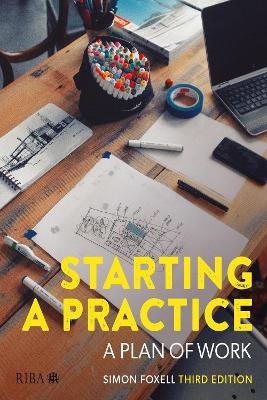
Starting a Practice
RIBA Publishing (Verlag)
978-1-85946-988-0 (ISBN)
Running your own practice can bring
immense job satisfaction, but it is not without its risks. Do you have all the
information at hand to set up confidently on your own?
Comprehensive, accessible and easy to
use, Starting a Practice helps architects navigate the pitfalls
associated with establishing a successful business.
This fully updated 3rd
edition is mapped to the RIBA Plan of Work 2020 and approaches starting a
business as if it were a design project, complete with briefing, sketching layouts
and delivery. It features new material on professionalism and ethics,
sustainable development and achieving a net-zero carbon emission built
environment.
Invaluable for Part 3 students, early
practitioners and those considering setting up from scratch or wanting to
consolidate an existing business, Starting a Practice gives architects
the tools they need to thrive when setting out alone.
Features essential guidance on:
• Preparing a business plan
• Choosing the right company structure
• Setting aspirations
• Monitoring finances
• Getting noticed
• Securing work
• Retaining and developing staff
• Planning for disaster.
Simon Foxell is Principal of The Architects Practice. He has designed buildings across the UK including houses, schools and offices and is a recipient of the prestigious Benedictus Prize awarded by the Union of International Architects. In recent years he has worked with schools and local authorities, designing new facilities and advising on development programmes. He was lead design adviser to Birmingham City Council’s Transforming Education programme from 2007 to 2010. He is a core member and co-ordinator of the Edge, the built environment think tank. He is a former member of the RIBA Council and Board and was Chair of both Policy and Strategy and RIBA London region. He sat on the RIBA’s recent Ethics and Sustainable Development Commission. He has authored multiple books, most recently Professionalism for the Built Environment (Routledge, 2019).
Preface
About the Author
Acknowledgements
Stage 0 Strategic
Definition
Strategy formulation
Start-up thinking
Alternative modes of practice
Business mentor
Accountability partner
Feasibility study
Escape routes
Stage 1 Preparation
and Brief
Setting outcomes & aspirations
Knowledge and skills
Global Challenges
Budget
Programme & execution plan
Stage 2 The Outline
Business Case
SWOT analysis
Market research
Advice
Professional obligations
Network
Business training
Investment and risk
Funding opportunities
The outline business case (OBC)
Stage 3 The
Business Plan
The business plan
The company
Business potential
Your offer
Responsibilities & ethics
Sustainability
Practice promotion
Business arrangements
Finances
Data management
Company or trading name
Stage 4 Business
Design
STRUCTURE
Practice culture
Design culture
Service delivery
Customer experience (CX)
Practices and policies
Information management
Knowledge management
Intellectual property (IP)
Developing standards
Training and CPD
Health and safety
Performance and feedback
COMPONENTS
Graphic identity
Premises
Office basics
Equipment
Bank account
Insurance
Professional advisers
Keeping account
Tax, National Insurance and VAT
Pensions
Stage 5 Starting up
SETTING OUT YOUR STALL
Planting your flag
Declarations and commitments
Performance monitoring
Openness
Relationships
GETTING NOTICED
Marketing
Publicity materials
Networking
Thought leadership
Social entrepreneurialism
Overcoming procurement barriers
WINNING WORK
Working at risk
Negotiation
Saying ‘No’
Generating your own work
APPOINTMENTS AND FEES
Appointment
Fees
Expenses
WORKING
Professionalism
Organisation
Health and safety at work
On-line tools
Project staffing
Records
Quality control
Change control
Standard procedures
Resourcing
Time management
Research and innovation
Risk
Locums
Money
IT
Trouble
Taking on staff
Skill development
Performance
Verifying outcomes
Sharing information/feedback
Giving back (to the profession)
Stage 6 Keeping
Going
Maturing
Benchmarking
Reviewing
Office manual
Quality management
Workload
Skills
Retaining & developing staff
Planning for disaster
Work–life balance
Stage 7 Evaluation
and Looking Ahead
The (next) business plan
Forward planning
Practice positioning
Size and growth
Staff progression
Succession planning
The future of work
Conclusion
Bibliography and websites
Index
| Erscheinungsdatum | 02.09.2021 |
|---|---|
| Verlagsort | London |
| Sprache | englisch |
| Maße | 189 x 246 mm |
| Themenwelt | Technik ► Architektur |
| ISBN-10 | 1-85946-988-4 / 1859469884 |
| ISBN-13 | 978-1-85946-988-0 / 9781859469880 |
| Zustand | Neuware |
| Informationen gemäß Produktsicherheitsverordnung (GPSR) | |
| Haben Sie eine Frage zum Produkt? |
aus dem Bereich


